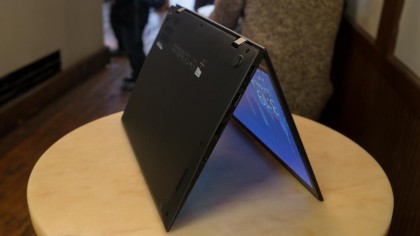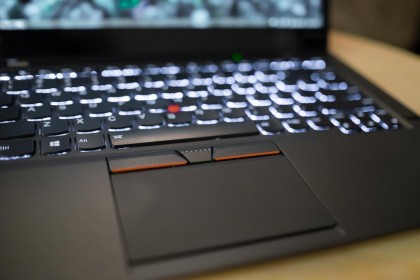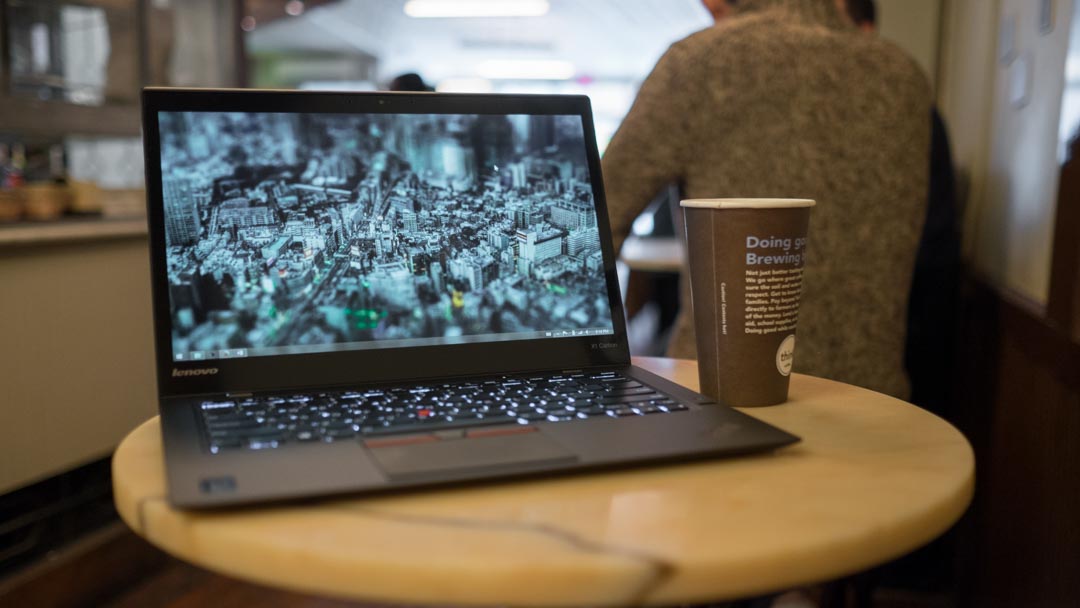Why you can trust TechRadar
If there's one thing the Lenovo X1 Carbon is good at, it's being a reliable work horse. Thanks to a capable Intel Core i7 processor with 8GB of RAM and a speedy 512GB SSD, the laptop steadily completed every task. Multi-tasking performance was similarly stellar even as I browsed the web with 15 tabs open in Chrome, double that number in Firefox alongside Skype and HipChat all while editing images in Lightroom.
Here's how the Lenovo X1 Carbon fared in our benchmark tests:
Benchmarks
- 3DMark: Cloud Gate: 5,568; Sky Diver: 2,816; Fire Strike: 792
- Cinebench CPU: 297 points; Graphics: 32 fps
- PCMark 8 (Home Test): 2,518 points
- PCMark 8 Battery Life: 3 hours and 41 minutes
The Lenovo X1 Carbon does not come housing a dedicated graphics card, but it still managed to get through the 3DMark Fire Strike benchmark test with 792 points. That might not sound too impressive, especially when a modest Nvidia GTX 960M inside the Alienware 13 can score 3,462 points. But you can put the Lenovo X1 Carbon through some graphically grueling tasks including playing YouTube videos at 4K and Hearthstone at full resolution on its highest settings.

Unsurprisingly, the X1 Carbon sails past the Dell XPS 13 with a higher-end CPU and lower screen resolution. This is clearly evident as the Dell's only put up a 739 Fire Strike score, despite the fact it comes packing the same integrated GPU as the X1 Carbon. Even processor performance on the X1 Carbon skips ahead of the XPS 13, the PCMark8 benchmark results are 2,518 points and 2,104 points, respectively.
Comparing the Lenovo X1 Carbon to the 13-inch MacBook Pro proves to be a bit more problematic, as the same benchmarks are largely not available to both Windows and OS X Yosemite, with the exception of Cinebench. According to the results of the benchmark, the MacBook Pro performs better with a Cinebench score of 310 points, whereas the Lenovo completed the same test with 297 points, and the Dell with 258 points.
Cinebench measures the speed at which a processor's cores can work in tandem to render a dense 3D image. 42 to 13 points of difference is negligible, but the scores show that the X1 Carbon, on a performance-level, is nearly on par with the MacBook Pro, while the Dell XPS 13 lags behind with its slower processor.

Don't leave it in the sun
In a world full of 1080p screens, the Lenovo X1 Carbon's 2,560 x 1,440 display comes as a refreshing treat. And it's only made better by the fact that it's an IPS panel (which produces accurate colors and wide viewing angles). Unlike a 4K screen, most applications actually scale fairly well to the X1 Carbon's QHD resolution, save for a bit of pixelated text in Skype and some shrunken user interfaces, such as Blizzard's Battle.net client.
While, the screen is amazingly sharp and vibrant in the office, taking it outside and glare becomes a serious issue, despite the anti-glare coating designed specifically to reduce reflections. Rather than preventing glare, the screen coating on the X1 Carbon seemingly just spreads sunlight across the entire display panel. Whether you're sitting outside on an overcast day or using the machine at the windows seat of a train, you'll have a hard time discerning what's on your screen when you take this machine outside.
Another pitfall of this laptop is that its down-firing speakers sound very tinny and easily become distorted as soon as you push up the volume past 20 in Windows 8.1. Booming, full-bodied sound isn't something you would expect out of a business laptop in the first place, but the X1 Carbon isn't a machine you would want to use to host a video conference with everyone in the office.

Quick charge and drain
Battery life on the Lenovo X1 Carbon expired after an all too unimpressive 4 hours and 15 minutes in my testing. And this is after running the laptop on a lightweight regiment of tasks, including writing up this review in Microsoft Word, playing music with the OutColdPlayer, chatting in Skype and HipChat as well as browsing the web with 15 open tabs at any given time.
The Lenovo X1 Carbon also didn't fare too well with the PCMark8 synthetic battery life test, lasting just 3 hours and 41 minutes, However, it's a big improvement from last year's model, which ran for just 2 hours and 55 minutes, especially considering the current review unit is running a much more demanding Intel Core i7 processor over a Core i5 chip.
Switching the laptop to Lenovo's power-optimized mode ups battery life to 6 hours maximum. Another good thing about the X1 Carbon is it charges quickly, topping off a half empty battery in just an hour.
The Dell XPS 13, by comparison, was able to stay on for a much longer 7 hours and 40 minutes while on a constant loop of video playback. The incredibly small Ultrabook also ran the PCMark8 battery test for a longer 4 hours and 21 minutes.
Longevity has always been a bonus of using Macs, and the 13-inch MacBook is one of the longest lasting laptop's we at TechRadar have ever reviewed. Streaming a non-stop playlist of 1080p video, Apple's darling notebook kept going and going for a full 12 hours and four minutes.

Bundled software
Although it might feel, look and smell like an Ultrabook, the X1 Carbon is as much a business laptop as the rest of Lenovo's mobile workstation fleet. As such, enterprise users will feel right at home with the suite of productivity and utility apps Lenovo has preloaded onto its system:
- Lenovo System update – As the name might suggest, you'll be using this tool to keep the X1 Carbon firmware up-to-date.
- Mouse Properties – Rather than your typical Synaptics system tray client, this application handles all your trackpad preferences.
- Lenovo Settings – A quick, visual system tray that lets you tweak settings including Airplane mode, a mobile hotspot, the camera and more.
- Lenovo QuickControl – This program allows users to remotely control their laptop with a smartphone app, a clutch feature for presentations, available on iOS and Android.
- Lenovo Reach – Lenovo's internal cloud storage service, which users can access with their laptop or across all Windows, Android, and iOS devices.
Kevin Lee was a former computing reporter at TechRadar. Kevin is now the SEO Updates Editor at IGN based in New York. He handles all of the best of tech buying guides while also dipping his hand in the entertainment and games evergreen content. Kevin has over eight years of experience in the tech and games publications with previous bylines at Polygon, PC World, and more. Outside of work, Kevin is major movie buff of cult and bad films. He also regularly plays flight & space sim and racing games. IRL he's a fan of archery, axe throwing, and board games.

